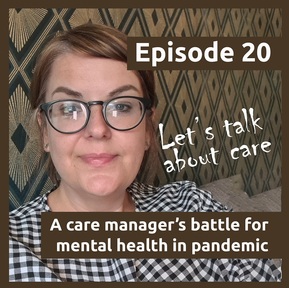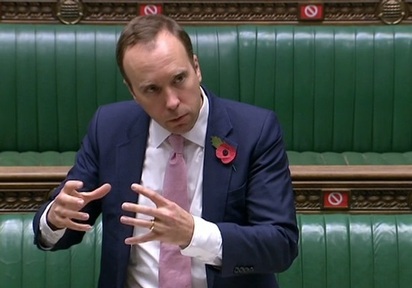I was having panic attacks says care home manager battling to save residents in pandemic
A care home manager has spoken about having panic attacks, hardly sleeping and described how her mental health suffered after nine of her residents died of Covid at her care home.

Dawn Bunter manages Iceni House Residential Home in Swaffham, Norfolk which cares for 75 residents and has revealed her struggles with mental health as a guest on the podcast 'Let’s Talk About Care'.
She started a new job as a care home manager at Iceni House just a few weeks before the care home went into lockdown in mid-February 2020 to protect its residents from Covid.
’I couldn’t function… I couldn’t breathe’
An outbreak of the virus at the home killed nine residents in April and May 2020. She began a career in social care 25 years ago but says nothing prepared her for the mental burden brought on by her repeated calls for ambulances in April and May last year.
She remembers being told by arriving paramedics that the local hospital had Covid.
Her worries were compounded by not knowing who had the deadly virus because there was no testing at the care home.
She also recalls “having to fight with hospitals” who wanted to discharge untested patients into the care home. She says the impact of the covid outbreak on her mental health “was huge”.
“I couldn’t function. I kind of went into “autopilot” mode I became kind of emotionless.
“I was so incensed in making sure it [Covid] didn’t come back I would have panic attacks.
“I couldn’t breathe.”
’By three o-clock… their lips had turned blue’
She recalls the story of one resident who had to go to hospital but returned “two weeks later with Covid-19 and we weren’t informed”.
She remembers “walking around blind at the time, not knowing who had it. “You feared everybody did - it was that paranoia where you walked around and a resident would cough or a resident would feel hot to touch or a resident would display other symptoms but you immediately associated it with Covid-19.”
Her residents only got tested for virus if they were admitted into hospital with suspected Covid.
The care home manager says “some people would be perfectly fine at 9 o’clock in the morning but by three o-clock they couldn’t breathe and their lips had turned blue.”
’I blamed myself’
“I blamed myself. That I was not doing my job properly. That I wasn’t keeping people safe. I was so frightened that this was my fault.
“I would lay in bed and think I’m a terrible person.”
Some 25,000 elderly people were discharged from hospitals to care homes without any Covid tests.
On the day Dawn Bunter spoke as a podcast guest, the Prime Minister’s ex-advisor Dominic Cummings was giving evidence in Westminster. Mr Cummings said he and the Prime Minister had been told “categorically in March that people will be tested before they went back to care homes”.
In April 2020, Health Secretary Matt Hancock insisted the government had tried to “throw a protective ring around our care homes”. Dawn Bunter has said she spent many months searching for it.

With no ‘protective ring’, she herself felt like a human shield as she battled to protect residents.
With government guidance for care homes changing often at 8pm on a Friday night, Dawn says she made “big decisions” about people’s lives.
She remembers feeling “petrified” that she hadn’t handed over the correct information.
She was told by government not to wear PPE because that wasn’t a requirement at the time.
The stress of not knowing who had Covid and the deaths of residents led her to question her own efforts and write out her resignation letter three times last year.
“I would go home and worry to the point where I would get back in the car and come back in.”
“I was mentally drained and it was nothing like I’ve ever felt before.”
Dawn called a doctor who offered her a six-week sick note and tablets for her anxiety.
’Burned out’
She says the last year left all of her staff feeling “burned out”. Some staff had moved into the home to protect residents including a care worker who was also a volunteer for The Samaritans.
But Dawn, whose care home had 75 staff at the time, felt unable to reach out to this co-worker for help.
Dawn describes having an “internal struggle” and going into “autopilot mode” of “right, pretend everything is fine, pretend everything is happy and sunny at work and keep smiling.”
“I wanted to be the person saying we can get through this” to staff and the manager says she only spoke to her husband about how she was feeling. However, she soon realised no one understood her feelings of guilt and eventually stopped talking about it to her husband.
“When I look back I don’t know how I survived.”
Dawn sought private counselling in July 2020 and says the impact has been “huge”.
The care home now pays for staff to have private counselling. The pandemic has led to many care homes appointing ‘mental health first aiders’ for staff. A mental health first aider is also working at Iceni House care home.
Dawn believes care home managers should not take on the extra burden of being mental health first aiders themselves at work but should let another member of the team get trained up to take on the role.
Family hugs for residents took place earlier
She remembers feeling alone when it came to her response to government guidance on visiting. In September and October 2020, Dawn says she felt she was the only one breaking the rules by allowing families to hug care home residents.
It became possible after she launched a care home pilot involving regular PCR testing of relatives and negative test results. It meant families could reunite indoors without Perspex screens.
She now allows more than five visitors per resident, while government guidelines currently stipulate a maximum of five.
“On June 1 we’re opening the doors we’re not having appointments anymore, as long as our relatives can prove a negative test result”, she says.
Brexit paperwork causing ‘stressed out’ workers
As a result of Brexit, every EU national living in the UK must apply for Settled or Pre-Settled Status, before the deadline of 30 June, or they will lose their rights to live and work in the country.
Dawn says some of her staff are affected, leaving them feeling “stressed out” and “fearful”. “These are actual people and their lives, it shouldn’t be down to a single piece of paper because of Brexit.”
Dawn has this advice for people who have struggled mentally during the pandemic and continue to struggle. “Talk to people. Don’t be afraid to call people like The Samaritans. Don’t feel scared to show your feelings. Don’t internalise things like I did", she says.
Karolina Gerlich, the executive director of The Care Workers’ Charity is urging those in the care sector who feel they are struggling with their mental health to contact the charity for support.
Up to 10 hours of free 1 to 1 therapy with a qualified specialist is available and need not be Covid-related. You can apply for mental health support from The Care Workers’ Charity by visiting the charity’s website.
The Samaritans has extended its helpline for frontline health and care workers in England to September 2021 after more than 20,000 health and care workers were found to have contacted The Samaritans since March 2020
The Samaritans’ dedicated helpline for NHS and social care workers in England is 0800 069 6222
The dedicated helpline is not intended for people who are feeling immediately suicidal. Anyone experiencing suicidal thoughts can contact the Samaritans' free 24-hour helpline on 116 123
To listen to the 'Let's Talk About Care' podcast series click here
Latest News
 29-Jul-24
Dementia Bus gives carehome.co.uk staff insight into life with dementia
29-Jul-24
Dementia Bus gives carehome.co.uk staff insight into life with dementia
 01-Mar-24
Find out the top care homes in 2024
01-Mar-24
Find out the top care homes in 2024
 21-Mar-23
UK's top care homes in 2023 revealed
21-Mar-23
UK's top care homes in 2023 revealed
 03-Jan-23
carehome.co.uk launches free care helpline
03-Jan-23
carehome.co.uk launches free care helpline
 13-Dec-22
5 mins with Emily Whitehurst, chief operating officer for Constantia Healthcare
13-Dec-22
5 mins with Emily Whitehurst, chief operating officer for Constantia Healthcare